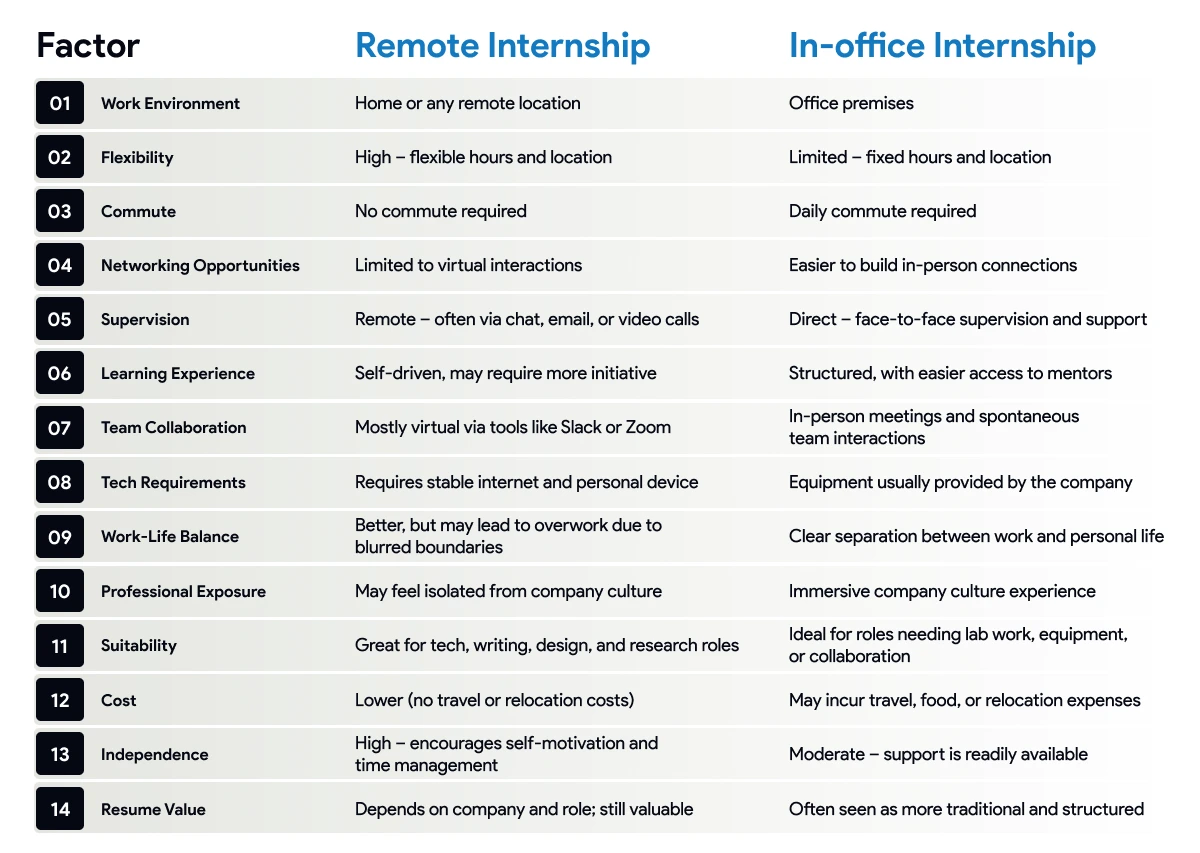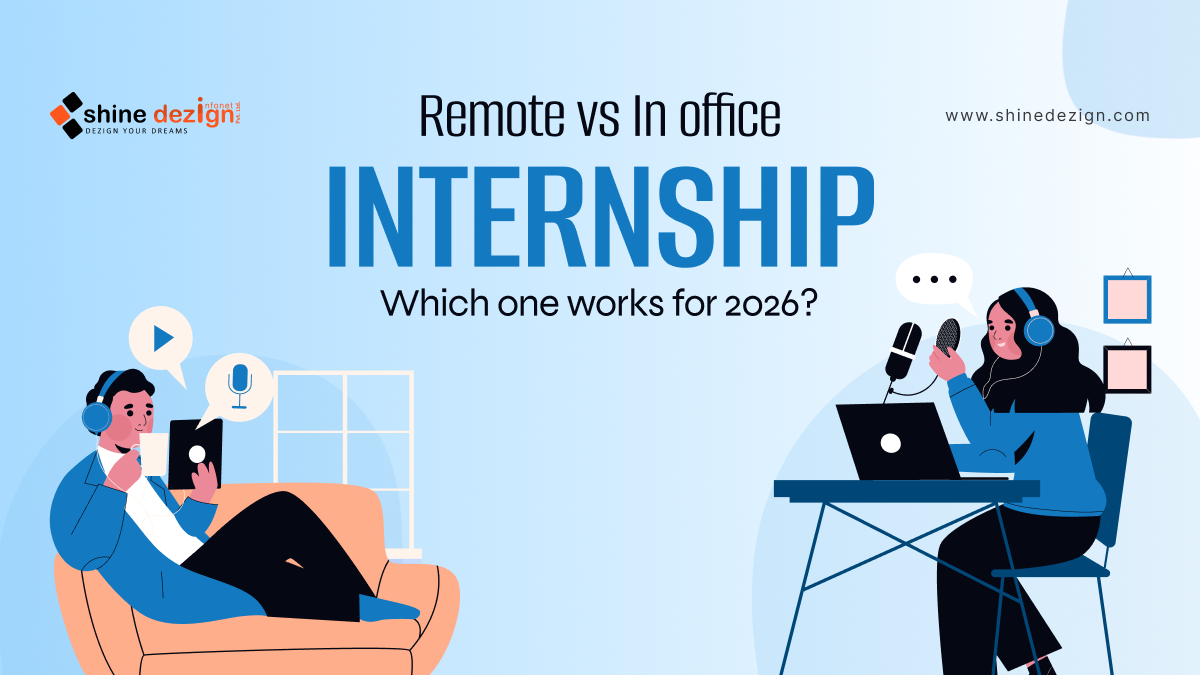From last couple of years, we have noticed a significant shift how business operate, especially when it comes to remote work. As per Forbes, around 12.7% of full-time employees in India work from home, while 28.2% work a hybrid model. As a newbie you might be thinking about which internship model is best for you, remote or in office. In this blog, we will cover the detailed insights on remote vs in-office internships, which one works for you.
Remote Internship
A remote internship is a professional work experience that is completed entirely online. Interns carry out their responsibilities from a location of their choice, without needing to be physically present at the company’s office.
These internships have become increasingly popular with the rise of digital tools and global connectivity, making them an excellent option for students and professionals seeking flexibility.
How it works?
The process begins by applying online through the company’s website or an internship opportunities. Once selected, interns usually attend a virtual onboarding session to understand their role, tools, and expectations.
Communication is maintained through platforms like Zoom, Microsoft Teams, Slack, and email. Interns work on assigned tasks or projects independently and submit their work digitally. Regular check-ins with supervisor’s help ensure progress and provide feedback.
Pros and Cons
Pros:
Flexibility: Interns can work from anywhere, allowing for better schedule management and work-life balance.
Cost-Effective: No commute or relocation costs, making internships more accessible to a wider range of applicants.
Global Exposure: Opportunities to work with companies in different countries, gaining international experience.
Digital Skills Development: Interns become proficient in remote tools, communication platforms, and self-management—valuable in today’s workforce.
Cons:
Limited Networking: Lack of in-person interaction can reduce opportunities to build strong professional connections.
Distractions at Home: Working remotely requires strong discipline to stay focused and productive.
Communication Delays: Time zone differences or lack of face-to-face interaction can lead to misunderstandings or slower feedback.
Less Hands-On Experience: Certain fields may lose the practical, in-person learning that traditional internships provide.
In-Office Internship
An in-office internship is a traditional form of work experience where interns physically attend a workplace to perform assigned tasks. This format provides hands-on exposure to the company’s environment, team collaboration, and day-to-day operations. It remains a popular choice across industries like finance, healthcare, engineering, media, and more.
How it works?
Interns apply through company websites, career fairs, or college placement programs. Once selected, they report to the office during regular working hours, typically 5–6 days a week. Interns are assigned a supervisor or mentor and may work independently or as part of a team.
Tasks vary by department but often include assisting with ongoing projects, administrative duties, and attending meetings or training sessions. Regular feedback is provided to help interns grow professionally.
Pros and Cons
Pros:
Hands-On Experience: Interns get direct exposure to tools, systems, and real-world workflows.
Networking Opportunities: Being on-site makes it easier to build professional relationships with peers and mentors.
Workplace Discipline: Structured schedules help build punctuality, professionalism, and teamwork.
Stronger Mentorship: Face-to-face guidance allows for better learning and immediate feedback.
Cons:
Commuting & Expenses: Daily travel, meals, and sometimes relocation can add financial and time burdens.
Limited Flexibility: Fixed working hours may not suit everyone, especially students managing coursework.
Geographical Constraints: Opportunities may be limited to those living near the office location.
Distractions in Office: A busy office environment can sometimes be overwhelming or distracting for new interns.
Remote vs In-office Internship: Comparison Table

Which Internship you should consider?
The choice between a remote and an in-office internship depends largely on your personal goals, learning style, career field, and circumstances.
Choose a Remote Internship if you:
- Prefer flexible hours or need to balance other commitments.
- Live far from major cities or cannot relocate.
- Are comfortable with digital tools and self-discipline.
- Are in a field like tech, writing, marketing, or design.
Choose an In-office Internship if you:
- Want hands-on experience and face-to-face mentorship.
- Thrive in structured environments.
- Aim to build strong in-person networks.
- Are in fields that require lab work, equipment, or direct supervision (e.g., engineering, healthcare, hospitality).
Remote vs In-office Internship: Conclusion
Both internship types offer valuable experiences, but they serve different needs. Remote internships provide unmatched flexibility and are excellent for developing independence and digital communication skills. In-office internships offer richer networking opportunities, direct mentorship, and exposure to company culture. Ultimately, the best choice is the one that aligns with your career goals, learning preferences, and life situation.
Your questions, our answers
Yes, a remote internship is worth it if: 1. You're looking to gain experience with flexibility. 2. You want to work with companies outside your location. 3. You're self-motivated and comfortable working independently.
It depends on your goals: 1. Online (Remote): Great for flexibility, tech roles, content creation, and global exposure. 2. Offline (In-office): Ideal for hands-on learning, stronger mentoring, networking, and fields like engineering, healthcare, or hospitality. 3. Verdict: Neither is "better" universally
Remote” means you perform internship tasks from a location outside the company’s office typically your home, using digital communication tools (e.g., Zoom, Slack, Email). You don't need to commute or be physically present.
Stay organized: Use tools like Notion, Trello, or Google Calendar. Communicate proactively: Update your supervisor regularly. Be responsive: Check messages/emails frequently. Ask questions: Don’t hesitate to seek clarity. Set a routine: Structure your workday to stay productive.
Remote jobs are very competitive because they attract applicants from around the world. With no geographic limitations, more people can apply for the same position, increasing the level of competition. Employers often look for candidates who are self-motivated, digitally proficient, and possess strong communication skills, as these are crucial for working independently in a remote setting.













